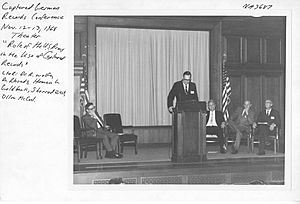Robert Wolfe facts for kids
Quick facts for kids
Robert Wolfe
|
|
|---|---|

Robert Wolfe (left)
|
|
| Born | March 2, 1921 Burlington, Vermont, U.S.
|
| Died | December 10, 2014 (aged 93) Washington, D.C., U.S.
|
| Resting place | Arlington National Cemetery |
| Education | Columbia University |
| Occupation | Archivist |
| Years active | 1961–2005 |
| Employer | U. S. government |
| Organization | US National Archives |
| Known for | Knowledge of World War II Nazi war documents. |
|
Notable work
|
|
| Spouse(s) | Ingeborg Edith Kirch |
| Children | 2 |
Robert Wolfe (born March 2, 1921 – died December 10, 2014) was an American soldier, historian, and a special kind of librarian called an archivist. He worked for the U.S. National Archives. He was an expert on important documents captured from Nazi Germany during World War II.
Contents
Military Service in World War II
Robert Wolfe was a U.S. Army officer during World War II. He was hurt twice during the war, once in the Pacific and once in Europe. After his first injury, he helped train other soldiers. After his second injury in France, he worked in Paris, helping with military censorship. This meant checking information to make sure it was safe.
After the war in Europe ended, he joined a U.S. government office in Heidelberg, Germany. He first helped lawyers prepare for the Nuremberg Trials. These were trials where important Nazi leaders were judged for their actions during the war. After the trials, he helped the U.S. efforts to rebuild the German government.
In 1948, Robert Wolfe married Ingeborg Edith Kirch in Germany. They then moved back to the U.S. He finished his education at Columbia University in Manhattan, New York City. While studying for his advanced degree, he taught history and political science at Brooklyn College.
Working at the National Archives
Robert Wolfe started working at the National Archives in 1961. The National Archives is a place where the U.S. government keeps important historical documents and records. Before joining, he helped make copies of captured German records on special film called microfilm.
The Berlin Document Center
Robert Wolfe also worked as an expert for the U.S. Department of State regarding the Berlin Document Center (BDC). The BDC was a place in Berlin where many important Nazi Party records were kept after the war. He also advised Elie Wiesel, who helped create the United States Holocaust Memorial Museum.
From 1968 to 1994, Robert Wolfe was the main American person who helped arrange for the original Nazi Party records from the BDC to be returned to the German government. He wrote reports and papers about how these records were found and captured. For example, he wrote about how Nazi Party membership records were found at a paper mill in Schwabing-Freimann, Germany.
In 2001, Wolfe wrote a special report about how a U.S. Army agent named Michel Thomas found the Nazi Party's worldwide membership card file in May 1945.
Finding Hidden War Records
Robert Wolfe was part of a special group called the Interagency Working Group (IWG). This group included historians who helped make sure that many secret government records about Nazi war crimes were made public. This was part of a big project to share historical information.
The IWG helped declassify, or make public, eight million pages of documents. This greatly increased what people knew about Nazi war crimes and what happened to some people involved after the war. Wolfe was one of the writers of a report called U.S. Intelligence and the Nazis. This report was later published as a book in 2005.
One of the most wanted Nazi leaders was Heinrich Müller, who was the head of the Gestapo, the secret police. No one knew what happened to him. Robert Wolfe and three other historians studied the available evidence. They concluded that Müller was likely killed in Berlin as the war ended. Their findings were published in 2001.
The work of these historians helped people better understand World War II war crimes and how U.S. agencies were involved with those who were suspected of these crimes.
Later Life and Legacy
Robert Wolfe passed away on December 9, 2014. He was buried at Arlington National Cemetery with his wife, who died a few months later. He was one of the last experts at the National Archives who specialized in these historical records.
Historians remembered him as a valuable person who knew a lot about World War II records. Edwin Black, another historian, said that history had lost a "most valiant soldier" with his passing.
 | John T. Biggers |
 | Thomas Blackshear |
 | Mark Bradford |
 | Beverly Buchanan |

